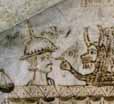“Judaism” as Political Concept: Toward a Critique of Political Theology
by David Nirenberg
The author begins:
“Ernst Kantorowicz’s The King’s Two Bodies bears an enigmatic subtitle: A Study in Medieval Political Theology. Enigmatic because although ‘political theology’ may be an allusion to Carl Schmitt’s 1922 book by that name, the meaning of the allusion remains elusive: Kantorowicz provided no commentary. My title, too, is meant to resonate with one of Schmitt’s, in this case his Concept of the Political. I will not be cryptic about my claim, which is that key European conceptions of the political—including Carl Schmitt’s—emerged through thinking about Judaism. Here I don’t mean Judaism as a historical or lived religion, but Judaism as a figure of Christian thought, a figure produced by the efforts of generations of thinkers to make sense of the world, a figure projected into that world and constitutive of it.
“’Political theology,’ I will suggest, is a conception of the political that emerged through Christian projections of Jewish enemies. Like so many other concepts, its meanings are multiple and unstable across time, but I will use the phrase only in a very general sense common to Schmitt and Kantorowicz, as well as to many other thinkers: that of a grounding of human political action in a commandment of obedience to the sovereign authority of God. I hope to convince the reader, first, that the representation of Jewish enmity has been historically important to the theorization of Christian political theology; and second, that this importance is not primarily the product of some essential aspect of lived (not to say ‘real’) Judaism, but was rather produced by the key terms and practices of Christian thought.” Continue reading …
 In this article David Nirenberg traces a long history in Christian political thought of linking politics, statecraft, and worldly authority to the broader category of carnal literalism, typed as “Jewish” by the Pauline tradition. This tradition produced a tendency to discuss political error in terms of Judaism, with the difference between mortal and eternal, private and public, tyrant and legitimate monarch, mapped onto the difference between Jew and Christian. As a result of this history, transcendence as a political ideal has often figured (and perhaps still figures?) its enemies as Jewish.
In this article David Nirenberg traces a long history in Christian political thought of linking politics, statecraft, and worldly authority to the broader category of carnal literalism, typed as “Jewish” by the Pauline tradition. This tradition produced a tendency to discuss political error in terms of Judaism, with the difference between mortal and eternal, private and public, tyrant and legitimate monarch, mapped onto the difference between Jew and Christian. As a result of this history, transcendence as a political ideal has often figured (and perhaps still figures?) its enemies as Jewish.
DAVID NIRENBERG is Deborah R. and Edgar D. Jannotta Professor of Medieval History and Social Thought at the University of Chicago, Dean of the Division of the Social Sciences, and Founding Director of the university’s Neubauer Collegium for Culture and Society. His books have focused on how Jewish, Christian, and Islamic societies have interacted with and thought about each other. These include Communities of Violence: Persecution of Minorities in the Middle Ages (1996); Anti-Judaism: The Western Tradition (2013); Neighboring Faiths: Christianity, Islam, and Judaism Medieval and Modern (2014); and the forthcoming Aesthetic Theology and Its Enemies: Judaism in Christian Painting, Poetry, and Politics (Spring 2015).
